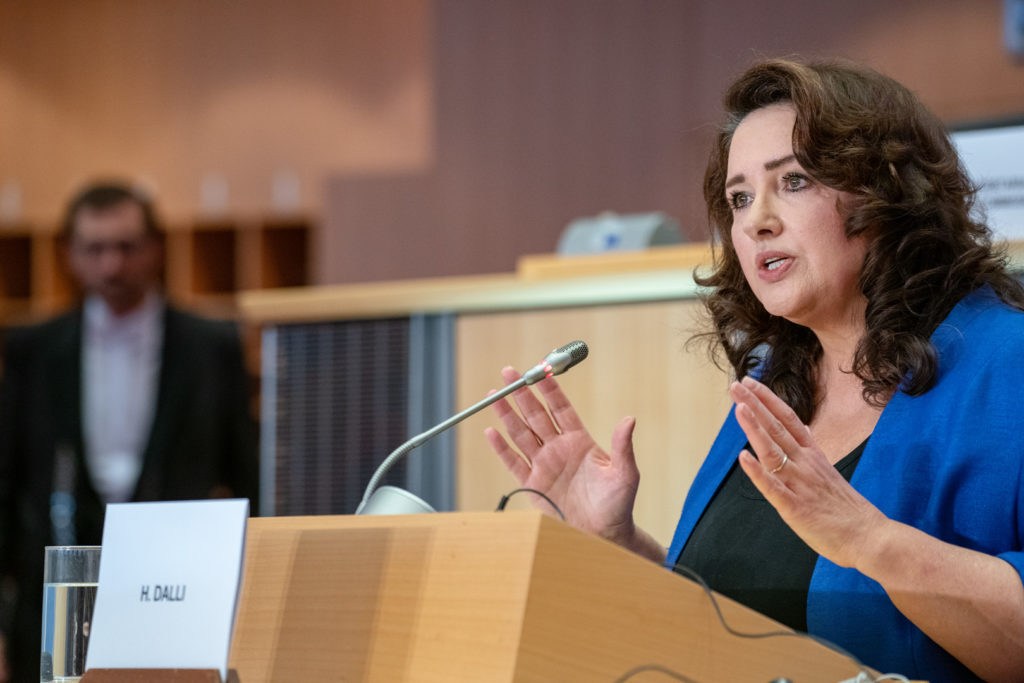Among the new Commissioners, Helena Dalli from Malta has been charged with a challenging portfolio called Equality. In the hearing last week in the European Parliament she was quizzed on her vision of Equality and her role as Commissioner.
Her main tasks will be to develop an EU Gender Equality Strategy, closing the gender pay gap, put an end to violence against women, promote work-life balance, integrate people with disabilities in the work-force and to unblock long overdue anti-discrimination legislation. Roma integration was almost forgotten in the hearing.
The hearing was conducted by two parliamentary committees, Employment and Social Affairs respectively Women’s rights and Social Affairs, assisted by the Committee on Civil Liberties, Justice and Home Affairs. In general, MEPs seemed impressed by Dalli’s performance and welcomed President-elect Ursula von der Leyen’s decision to appoint an Equality Commissioner for the first time.
Dalli, 57, has a PhD in Political Sociology and brings extensive experience from her home country, where she has been a member of the Parliament of Malta since 1996. She has been Parliamentary Secretary for Women's Rights in the Office of the Prime Minister. She has served as Minister for Social Dialogue, Consumer Affairs and Civil Liberties, and also as Minister for European Affairs and Equality.
Equality for all
In her mission letter (10 September) to Dalli, the President-elect wrote that EU draws strength and unity from its diversity — of people, of culture and of traditions. “Your task over the next five years is to strengthen Europe’s commitment to inclusion and equality in all of its senses, irrespective of sex, racial or ethnic origin, age, disability, sexual orientation or religious belief.”
Dalli is instructed to work under the guidance of the Vice-President for “Protecting our European Way of Life”, Margaritis Schinas from Greece. A Task Force composed of experts from the Commission services will support her. On matters relating to equality, she will also draw on the relevant units of the Directorate-General for Justice and Consumers.
Dalli wrote in her written answers to the Parliament’s questionnaire before the hearing that she during all her life has been motivated by a yearning for fairness and equality and a will to rectify injustices and build a better world for all.
“We must continue to support the most vulnerable in society, who are marginalised because of multiple discrimination, or are trapped in situations of domestic violence; thus my resolve to legislate in the field of equality, promote the ratification of human rights instruments and raise the protection that applies for the more vulnerable members of our societies,” she wrote.
“We have an obligation to mainstream and to promote gender equality in the EU and in all Commission actions. The Treaty provides a strong mandate and represents a political commitment that I will make the most of as a Commissioner for gender equality issues.”
Asked at the hearing about the link between equality and the controversial concept “Protecting our European way of life”, she replied that she has to work with Vice-President Schinas and that they both agree that equality is a European way of life.
Helena Dalli described equality as an infinite resource. “There is enough equality for everyone and we can sustain it. On the other hand, discrimination excludes, marginalises, and leads members of society to the brink. Discrimination is a wasteful practice. It robs members of society of their wellbeing, fulfilment and prosperity.”
Roma integration
Although Roma integration was not mentioned explicitly in her mission statement, Dalli briefly referred to the need to integrate Roma in society. “80% of Roma persons are below their country’s at-risk-of-poverty threshold.”
In fact, the more than 11 million Roma are the biggest ethnic minority in Europe, without any historic homeland, and living in nearly all countries of Europe. Despite EU efforts to integrate them and improve their living standards, they are still lagging behind the majority populations in education, housing, employment, health and empowerment.
At least one MEP, Lucia Ďuriš Nicholsonová, chair of the Committee on Employment and Social Affairs, drew the attention to the discrimination of Roma and socially excluded Roma communities in the EU Member States.
President-elect von der Leyen presented her team only a few days after the Commission had presented its annual report on Roma integration in the Member States. There was apparently no reference to Roma integration in any of the portfolios of the eight Vice-Presidents and the other Commissioners-Designate.
The Brussels Times asked the Commission if someone in von der Leyen’s team will have an overall responsibility for Roma integration. The acting chief spokesperson replied, “that inclusion of minority groups in the EU, including Roma, has been, and will remain to be, a priority for the European Commission”.
Under the current Commission mandate, fostering equality and fighting discrimination was part of the Justice portfolio and fell under the responsibility of Commissioner Vera Jourová, supported by Commissioner for Employment and Social Affairs, Marianne Thyssen.
“The importance that is given to inclusion and equality in the EU is also clearly reflected in the structure of the next Commission, in which the Commissioner-designate for Malta, Helena Dalli, is put forward as Commissioner for Equality. Her task will consist of strengthening Europe’s commitment to inclusion and equality across the EU, among others by putting forward new anti-discrimination legislation.”
Helena Dalli promised in the hearing that she will establish a Task Force on Equality within the first three months of the new Commission. “It will be mandated with the complicated mission of swiftly building an intersectional approach for equality in all the policies of the EU and should be well equipped to tackle the huge task of mainstreaming equality in the EU.”
M. Apelblat
The Brussels Times

